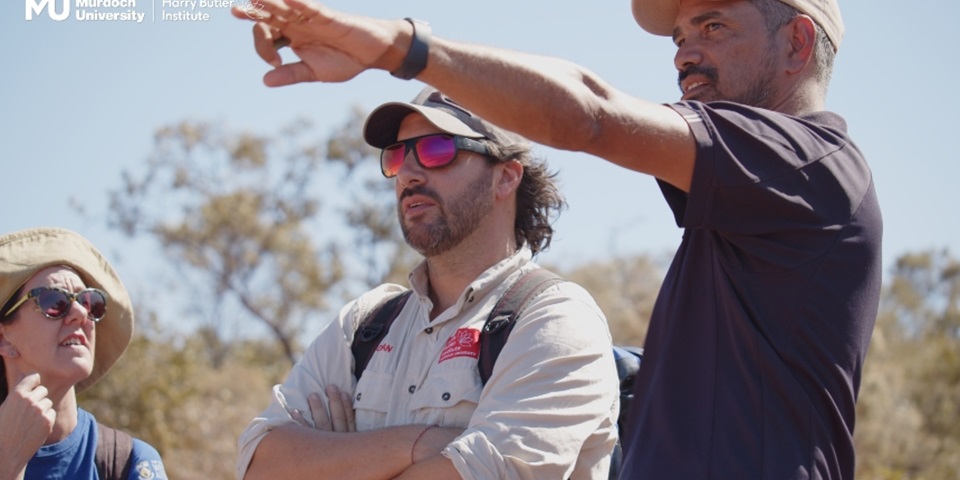News
United Nations endorses groundbreaking WA marine conservation project

An ambitious four-year project to integrate social, cultural and ecological research into management of marine and coastal areas with Yawuru Traditional Owners has been endorsed by UNESCO as a UN Ocean Decade Action.
The UN Ocean Decade is a 10-year framework to identify, generate and use critical knowledge to manage the ocean sustainably.
The Yagarrajalajalan nagula buru project being co-led by Murdoch University’s Dr Adrian Gleiss and Dean Mathews of Nyamba Buru Yawuru tackles a problem of great importance to resource managers globally: how equity in resource management can be achieved with First Nations peoples.
Marine environments hold shared resources accessed by a whole range of stakeholders with very different interests and responsibilities, which creates potential barriers for effective management.”
Dr Adrian Gleiss
“We are concentrating on a single jointly managed marine park in Western Australia, Yawuru Nagulagun (Roebuck Bay) and working with both joint managers: the Yawuru Traditional Owners and the Department of Biodiversity, Conservation and Attractions, to create a thorough understanding of the social, cultural and ecological forces that influence and inform local, national and global conservation practices.”
Australia provides an important case study regarding the opportunities and challenges of managing shared marine resources in cross-cultural settings.
The way green turtle and dugong populations are managed in Roebuck Bay provides an excellent opportunity to explore these dynamics.
Traditional Owners throughout much of northern Australia have deep cultural ties and a long history of harvesting green turtles and dugongs. These species are also protected, important for tourism operators, and play integral roles in local ecosystems, as well as being intrinsically valued by broad parts of society.
The research aims to answer how to effectively co-manage marine resources – specifically turtles and dugongs – cross-culturally.”
Dean Mathews
“In doing so, it will identify and document which areas of Roebuck Bay have importance for customary practices surrounding the use of these marine resources, as well as identify areas of importance for recreational activities within the marine park.”
“Together, this will help identify what management practices can be used to ensure the cultural, recreational, social and environmental values of the marine park are managed sustainably now and into the future.”
The program is expected to deliver social, environmental and economic benefits by developing strategies to resolve potential conflict and increase collaboration through better management and communication.
“This will also contribute to shared understanding of the importance of Yawuru saltwater Country and rich biodiversity as we seek to address the complex economic, social and cultural values,” Lloyd Pigram, Research Fellow at University of Notre Dame Australia said.
The project is funded by the Department of Jobs, Tourism, Science and Innovation with additional support provided by the Department of Biodiversity, Conservation and Attractions and Rio Tinto and will see Murdoch’s Harry Butler Institute work with partners in both Perth and Broome, including Nyamba Buru Yawuru, University of Notre Dame Australia, James Cook University, Edith Cowan University, The University of Western Australia and the Department of Biodiversity, Conservation and Attractions.
The project will bring key sections of the community together to deliver tangible benefits for multiple stakeholders including Traditional Owners, tourism and the broader community by facilitating collaboration and knowledge sharing.
This will provide a blueprint that can be used in any situation where resources are co-managed or knowledge is co-produced.
“We recognise the value, skills, knowledge and lived experience of Indigenous land managers, and this project is an opportunity to merge western science and traditional knowledge, which is really important for effective two-way knowledge sharing,” Dr Gleiss said.
The project’s benefits will be realised immediately at completion of the project due to the co-design and co-production with Yawuru and DBCA joint managers, which means the findings can be immediately put into practice.
The wider benefits are also apparent, with researchers from Kenya, New Zealand, Alaska and Greenland already signalling their interest to engage in the project, presenting a unique opportunity for Western Australia to emerge as a leader in the field of cross-cultural socio-ecological research.
Science Minister Stephen Dawson said the WA Government is committed to the sustainable management of the marine environment for the benefit of local communities and visitors to the state.
Having endorsement under the Ocean Decade will help foster an international collaborative response to assisting with our marine science issues as well as showcase the state’s leading science expertise.”
Science Minister Stephen Dawson
“These important research projects will provide vital information to support decision making and management of the local marine environment.”
The research team will host national and international forums for Indigenous and non-Indigenous managers and researchers to share experiences of two-way knowledge sharing and to compare co-management frameworks.Learn more about the critical conservation work being done at the Harry Butler Institute.
News
United Nations endorses groundbreaking WA marine conservation project
Posted on